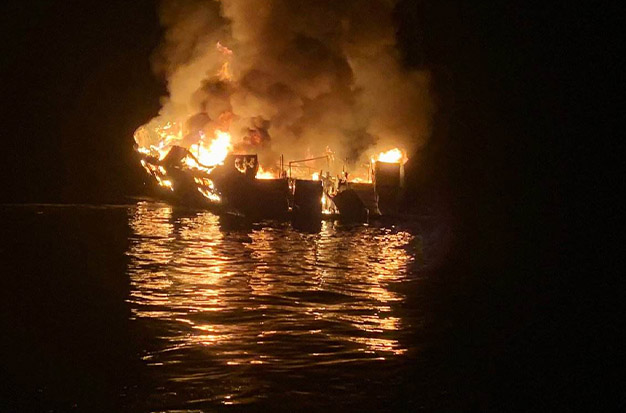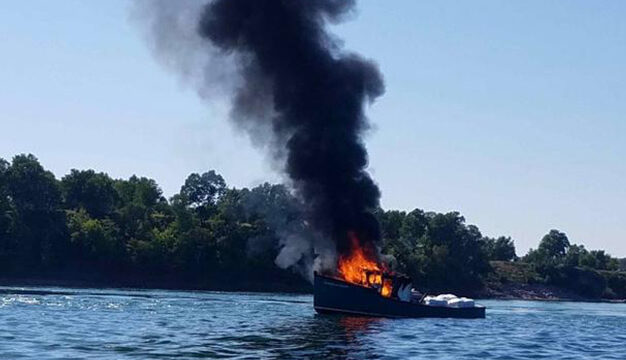What must be done immediately if a boat catches fire?
If the boat is moving, come to a complete stop. In any other case, turn off the fuel line. Any additional electrical devices that the fire might harm should be turned off. All the passengers should be calmed down and placed in a secure position before using a fire extinguisher to put out the flames. Also take precautions, like keeping the motor maintained.
Learn more about putting out boat motor fires by reading on. You can save your boat and the people on it if you stay vigilant.
What Principal Factors Give Rise To Boat Fires?
You might also be interested in some research from the Boat US website, which listed the top 5 causes of boat fires in the country.
- Off-boat sources – 26%
- Engine electrical – 20%
- Other DC electrical – 15%
- AC electrical – 12%
- Other engines – 9%
- Batteries – 8%
What Should You Do? ( Step By Step Guide)
Switch Off The Engines
If the engine is still running, the majority of boat fires worsen. An explosion could happen as a result of the fuel flowing to the engine easily catching fire.
Turn Off The Fuel Supply
In order to turn off the fuel supply to the engine, all boats are equipped with a safety feature. In the event that the fuel lines have been damaged by the fire, this is done to ensure that fuel does not leak out. The fuel may leak from the tank and explode when it gets there.
Turn Off Gas Cylinders
To ensure that there are no gas leaks should the fire compromise the gas lines, turn off the nozzles on any gas cylinders that are on the boat. Turning off the nozzles lessens the risk of an explosion even though the heat of the fire puts the cylinders at risk.
Turn The Boat Into The Wind
Turn the boat so that the stern faces the direction of the wind. This aids in containing the front-burning flames’ spread. Since the wind will be coming from the front, the flames will remain there. When a fire starts at the front of the boat and you turn it into the wind, the wind will cause the front of the boat’s fire to spread more quickly to the stern.

Beware Of Smoke
Harmful substances are carried by smoke from a fire. Make sure to flee the smoke if a fire starts in front of the boat. The victim may become incapacitated or die from carbon monoxide exposure, allowing the fire to engulf them.
Radio For Help
It is always best to keep a portable radio close by for such emergencies. Use it to radio for help, in case there are other boats or ships that can come to your rescue
Muster The Passengers To A Safe Area
if you have passengers who do not have sailing experience, you should muster them into a safe area where they can all be accounted for. As you gather them, be sure to remind them to put on their life jackets in case you have to leave the boat before the fire is put out.
Use The Marine Fire Extinguisher
As many of the flames as you can control should be extinguished. Foam and carbon dioxide extinguishers are the best marine extinguishers. When a fire is brought on by fuel or grease leaks from the galley, never attempt to put it out with water. Because the oily materials simply float on the water, the fire spreads quickly as a result of them moving faster across the surface.
Effectively Use The Fire Extinguisher
a) P – Pull the PIN.
b) A – AIM at the base of the fire.
c) S – SQUEEZE the handle of the fire extinguisher.
d) S – SWEEP the fire by swinging the extinguisher from left to right in a sweeping motion.
Deploy The Life Raft
In case you need to use it should you be forced to abandon ship, have the boat’s life raft deployed close to where you gathered the passengers.
Choke The Fire
Oxygen is one of the key elements needed for a fire to flourish. Oxygen depleted, a fire eventually goes out. When designing fire extinguishers, this is the guiding principle. Do not open any windows or doors that lead to the area where the fire is currently burning. Hopefully, it will burn out before leaving the space.
Be Careful When Opening Doors And Enclosure Covers
When using a fire extinguisher, you should only open a door or cover far enough to allow the extinguisher’s nozzle to pass through. Throwing open a door or cover only causes oxygen to flow back, stoking the fire. In dire circumstances, such actions may result in a blowback explosion.
Call Emergency Services
if you are close to shore and have a cell phone signal, have someone call emergency services and call for help. Your call will be answered right away by the Coast Guard.
How To Prevent A Fire On Your Boat
I’ve gathered a few boat fire prevention tips to assist in preventing a fire from ever starting on your boat.
- Never combine heat, oxygen, and fuel because doing so will cause a fire to start.
- Verify that the ventilation systems in your home are tested and functional.
- Regularly maintain your engine and fuel system, and make sure the bilges are clean.
- Have a fire action plan that is clear to all passengers and easy to recall.
- Install carbon monoxide and smoke alarms on your boat.
- Regularly test each alarm on your boat.
- Put a gas vapor detector in the bilge and cabin.
- Before you go to bed or leave the boat, turn off the valves on the LPG cylinders.
- When an appliance is not in use, always make sure it is turned off.
- Use metal ashtrays when smoking, and make sure your butts are out.
- Over gas stoves in the kitchen, don’t hang curtains.
- Create a plan of escape that you can use in an emergency.
Conclusion
In the boat’s engine room, fires typically begin. Boat motor fires can be caused by a variety of things, such as electrical wiring or transmission overheating. Regardless of the cause, it is crucial to maintain composure and address the issue head-on before it gets worse.
Stop the boat and shut off the engine as soon as you notice fire on the motor. Use a fire extinguisher and put it in a wind-free area. Kidde FA Multi-Purpose Fire Extinguisher is one of the best items to have on your boat because it can protect both your life and the life of your boat.
Did you find this article on what to do right away if a boat motor catches fire to be helpful? Please tell us in the space provided below. We eagerly await your feedback.

